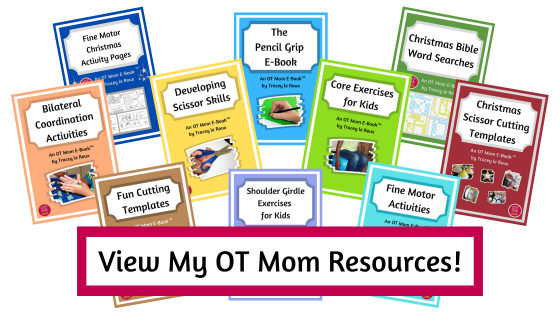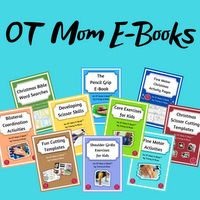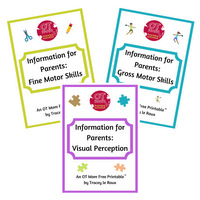- Home Page
- Gross Motor Activities
- Benefits of Chores
Benefits of Chores for Kids
Did you know that there are many benefits of chores for kids? You can use chores to work on gross motor and coordination skills, among others.
A quick online search will confirm that doing chores can teach kids responsibility and perseverance, and may also contribute to better life skills and self care. I have always been a firm believer in letting my kids do chores, and over the years I have noticed that some chores have specific gross motor benefits and can be used to help develop a child's skills.
There are many chores that are great at helping to develop upper body strength (shoulder girdle stability) and bilateral coordination skills.
Additional benefits of chores that require pushing, pulling or lifting are that they provide lots of proprioceptive input and can be considered "heavy work" tasks. Taking part in "heavy work tasks" can have a calming influence on a child who is feeling sensory overwhelmed or who is losing focus, and can be helpful as a break during the school day.
I sometimes link to products (#Ad) that are similar to those I use and love. If you do purchase something through my links, I will receive a small commission that helps support my site - thank you!
So on this page, I outline a few chores that your child can easily do in order to develop gross motor skills.

PS My photos are literally action shots of my own kids doing their tasks at home, so none of the pics are very professional, but hopefully they are clear enough to inspire you!
All activities should take place under close adult supervision. Some activities suggest the use of household equipment and garden tools - please monitor your child and only use tools/equipment which are appropriate for his/her age and abilities. Please read my disclaimer before you use any of the activities.
Laundry Chores
Folding Large Items
Good For: Bilateral Coordination
Folding
sheets and table cloths neatly is always so much easier when you have someone
to help you. So rope your child in to help you!
Helping you fold these large items will give your child a chance to practice large bilateral movements.
 Folding sheets
Folding sheets Hands working together
Hands working togetherFolding and Rolling Towels
Good For: Bilateral Coordination
Folding and rolling towels will help your child use both hands together in a coordinated way (bilateral coordination).
These pics show a child folding the towel in half (using his chin to keep it in place) and then rolling the towel so it stacks nicely in the linen cupboard.
Of course, you can also ask your child to continue folding the towel to the size you like it to be.
Actually, any clothes that need to be folded can give your child a chance to work on bilateral coordination skills.
 Folding a towel in half
Folding a towel in half Rolling a folded towel
Rolling a folded towelPushing and Pulling Chores
Sweeping, Mopping and Vacuuming
Good For: Bilateral Coordination, Shoulder Girdle Strengthening, Proprioception
Let your child help you with sweeping, mopping, and/or vacuuming, as these are great bilateral activities.
Sweeping, mopping and vacuuming all involve pulling and pushing so they are good "heavy work" tasks which can build shoulder girdle strength and stability as well as being good for proprioceptive input.
You may need to show your child how to hold the handle with both hands in an effective way, as it does not come naturally to many kids.
You may also need to consider the size of the broom/mop/vacuum cleaner to make sure it is not too large for your child to work with.
 Hands on the broom to sweep
Hands on the broom to sweepYard Work
Good For: Bilateral Coordination, Shoulder Girdle Strengthening, Proprioception
If there
are leaves or sand to be raked, snow to be shoveled, or some digging to be
done, give your kids a chance to work alongside you.
Not only will they be strengthening their upper body with the yard work, but their hands and arms will be working together in a coordinated way to maneuver the tools. Great for proprioception, too!
 Raking sand
Raking sand Raking leaves
Raking leaves Helping with yard work
Helping with yard workPlease do supervise your child with the use of spades and other sharp implements, encourage the wearing of closed shoes (unlike my son shown doing summer yard work!), and use common sense when assigning tasks according to their age and abilities!
Cleaning Chores
Cleaning With A Cloth
Good For: Bilateral Coordination, Shoulder Girdle Strengthening
Have your child clean the car, a table or any other surface using both hands together on a soft cloth.
Show your child how to use back-and-forth movements as well as
circular movements with both hands on the cloth. This is also a great activity for toddlers and preschoolers, who will probably enjoy wiping down any surface even if it does not need it!
 Toddler cleaning a small table with a cloth
Toddler cleaning a small table with a cloth Cleaning a car with both hands on the cloth
Cleaning a car with both hands on the clothThe ultimate aim is to get both hands moving together in a coordinated way, not to get a perfectly clean surface :-) so you may need to go back and finish it off later, but your child will have a lot of fun doing this with you!
Cleaning a vertical surface also helps to work the upper body and may help strengthen the shoulder girdle muscles - so you can use their enthusiasm to wipe down walls and blackboards as well!
Cleaning Windows
Good For: Bilateral Coordination, Shoulder Girdle Strengthening
Cleaning windows is another cleaning task that kids love! Washing windows can also help strengthen your child's shoulder girdle muscles as your child will be working against gravity on the vertical surface.
Let your child use a window cleaner sponge/squeegee to clean your house windows, or even your car windows. Encourage your child to have both hands on the handle at all times for best bilateral benefit.
Please make sure your child is standing on the ground and in no danger of falling through the window!
 Washing car windows
Washing car windows Washing house windows
Washing house windowsWashing Dishes
Good For: Bilateral Coordination
What kid can resist warm, soapy water with bubbles? Give your child some plastic dishes to wash with a sponge.
Even if it takes ages, this task requires both hands to work together - one hand holding the dish, and the other washing.
As a bonus, squeezing out the sponge helps strengthen hand muscles!
 Washing dishes
Washing dishesTip: If your kitchen won’t stand up to the water mess, then send your kids outside with a basin of soapy water, some dishes and a sponge. They’ll love you for it!
Toddler and Preschool Chores
One of the big benefits of chores for toddlers and preschoolers, is that they get to "work" alongside you, getting into the habit of helping you, while it is all still a huge game for them!
So, although these are not strictly gross motor benefits of chores, I have included them here for those of you with little ones.
Sorting Laundry
Good For: Visual Perception
Sorting laundry is a great task for younger kids, as it helps to work on their visual perception skills, particularly figure-ground perception (finding items in a busy background) and visual discrimination skills (matching items).
There are different ways to get kids to help you sort laundry - they can match socks, match outfits, and find their own clothes in the pile.
Showing them how to fold their clothes can also help them use their hands in a coordinated way.
 Sorting socks
Sorting socksPacking Away Cutlery
Good For: Sorting and Matching Skills (Pre-Math)
My toddlers and preschoolers loved being given the job of packing away the cutlery.
They had no idea I was using it to help with their sorting and matching skills, which are important pre-math skills.
 Packing away cutlery
Packing away cutleryJust make sure all sharp items are kept out of reach!
Incorporating The Benefits of Chores Into Your Child's Life
When kids are little, they often want to help their parents - it is up to us to grab those opportunities when we can, and involve them in cleaning, laundry etc. It may slow you down a little, and the end result may not be perfect, but by letting them do chores with you, you are building skills, creating good memories, and helping your children develop responsibility and perseverance.
The chores I have suggested on this page tend to be tasks which are done on an ad-hoc "work-beside-me" basis.
Regular daily chores are also important in a child's life, as they teach a child how to be responsible for their own self care, their own possessions, and be part of a family. In addition to making their own beds, picking up their own toys etc, you could ask your kids to carry out the above chores on a regular basis.
What worked best for my three kids was a weekly rotation - we took the big daily household chores (sweeping, folding laundry, unpacking the dishwasher etc) and divided it between the kids for a week at a time. So one child would do the sweeping for a week, and then swap to a different big household chore the following week.
Hopefully you can find a routine that works for you and for your family!
Thank you for visiting, and I hope you are excited about the possible benefits of chores for your own kids!
These chores (and a few more) are just a few of the many varied indoor and outdoor activities contained in my gross motor e-books, shown below.
All of my e-book resources contain photographs and instructions for each activity, much like the ones on this page!
- Home Page
- Gross Motor Activities
- Benefits of Chores
Share this page to help others!
FYI: More Articles On The Benefits of Chores for Kids
(these articles open in a new tab/window)
Didn't find what you were looking for? Try a search of my site!









